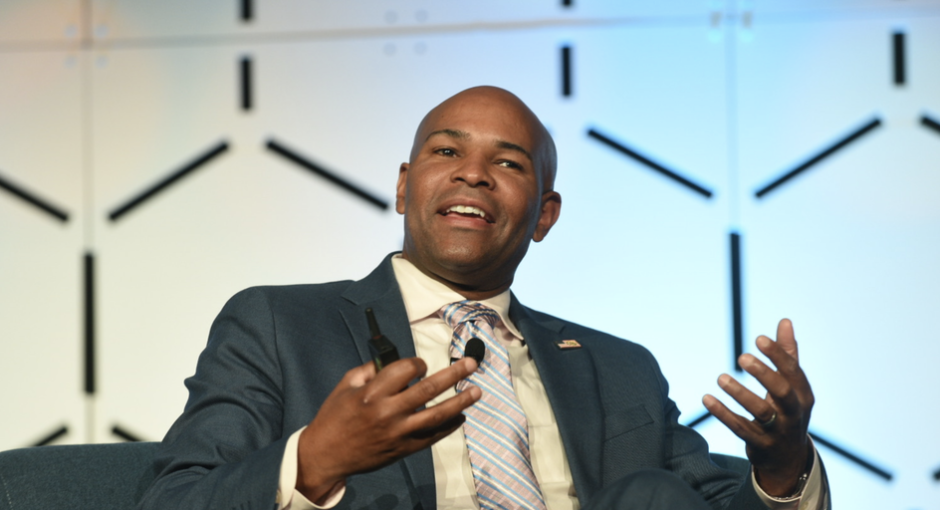Healthcare providers can suppress attacks on and build support for the 340B program by doing more to show the program helps vulnerable patients, the anesthesiologist who served as President Trump’s surgeon general said yesterday.
“We are fighting to deliver care to the vulnerable and to the underserved and we’ve got to show those outcomes, show the value you’re delivering,” former U.S. Surgeon General Jerome Adams told attendees of the 340B Coalition Summer Conference Wednesday in National Harbor, Md. “If we do that, we’ll have less attacks on some of the work that’s going on out there.”
Adams’ remarks about strategic 340B messaging continued a theme present in all featured speeches on Day One of the conference.
Adams, who served as the country’s surgeon general from 2017 to 2021, said he came to the attention of President Trump due to his time working for then-Gov. Mike Pence (R) as Indiana State Health Commissioner. He acknowledged his decision to serve in the administration was controversial and was not welcomed by all including some family members. However, he thought it was very important for the administration to become more diverse.
He showed a picture of the original White House task force to handle the COVID-19 pandemic and made it clear that he believed that the largely white male group did not reflect the whole country. Adams became one of ex-President Trump’s most well-known officials in the administration’s fight to control the pandemic with frequent TV appearances and speeches.
Adams said he has a deep understanding of the 340B program from personal experience. He said he first became involved with the program during his eight years chairing the Pharmacy and Therapeutics Committee at Indiana University Medical Center, a 340B DSH hospital in Indianapolis.
“I know the challenges in trying to serve the underserved,” he said. “We were really struggling and trying to figure out, ‘Do we approve this new cancer medication that’s going to extend someone’s life by six months, but at the expense of being able to give several thousand people vaccinations within our system?’ It was a shell game. You’ve got a pot of money and you’ve got to figure out how to spend it. So 340B really helped us serve our patients in a way that we wouldn’t have been able to otherwise.”
He told the audience that he continues to support the program and is now on the board of 340B pharmacy services company Avita Pharmacy. “The reason why I am on the board is because it is an organization that uses 340B to actually increase the number of [HIV patients] who are tested, get HIV medication, and become virally suppressed.”
Adams cited his experience handling an HIV outbreak in a rural county in Indiana and his efforts to legalize syringe service programs in the state to respond to hepatitis and HIV infections.
Adams is currently professor, presidential fellow, and executive director of health equity initiatives at the College of Pharmacy at Purdue University in West Lafayette, Indiana.
Adams highlighted how the 340B program serves as a template for the broader healthcare system by going beyond just access to medicines. “[340B] is listed as an affordability program, but we know that so many entities utilize the savings to reinvest back into the community,” he said, helping patients with access to food, housing, and transportation to get treatments.
At the same time, Adams said the 340B program is a work in progress. “It does a fabulous job, but if you had to build a system from scratch … would it look the way it looks right now? Probably not,” he said. “But we also have to make sure we are fighting for the people whom the system serves, continually trying to improve the system, promoting transparency and leaning into positive changes that will help us more directly care for the underserved.”
Pharmacists Should Leverage Public Trust
Adams cited a recent survey ranking pharmacists second behind nurses but above doctors in U.S. patient trust. “You are more trusted than doctors are; you need to leverage that,” he told conference attendees.
For example, pharmacists can be advocates for getting vaccinated. “I’m really worried on where we’re going on vaccinations,” Adams said, noting the U.S. recently almost lost its measles eradication status and that vaccine hesitancy rebounded in 2021 following a spike in vaccination levels in 2020 at the height of the COVID-19 pandemic. But with diseases such as polio, rubella, and measles re-emerging, “being advocates of vaccines is going to be huge,” he said.
The recent COVID-19 pandemic illuminated the extent to which current healthcare dollars are misdirected, Adams said. “COVID isn’t the problem, it’s the symptom,” he said. “The problem is our lack of investment in healthy communities, chronic disease, and opportunities for health. For centuries in this country, there’s been a failure to pay attention to [outcome] disparities and COVID was just a magnifying glass.” He noted that the people most affected by COVID were also those hardest hit by other conditions such as diabetes, cancer, and infant mortality. “The lesson of COVID is, we spend a heck of a lot of money on delivering care, but we don’t get great results for it,” Adams said.
For example, monkeypox is mostly affecting people who are HIV-positive, he noted. “If we don’t protect people, we set them up to be the victims of whatever assault comes next.” Currently, U.S. health spending ignores 80% of the problem, or so-called “social determinants of health,” such as transportation, food and affordable childcare, Adams said.
“That’s the challenge we have with 340B, it’s a healthcare-oriented program; how do we help people afford their medications?” Adams said. “But [covered entities] are using the savings to actually address the 80% of the problem. And we need to educate everyone—businesses, legislators and voters that spending more of that money upstream is going to push us further toward the trajectory of European countries that are spending less money and are getting better results.”


